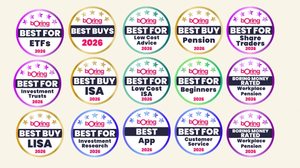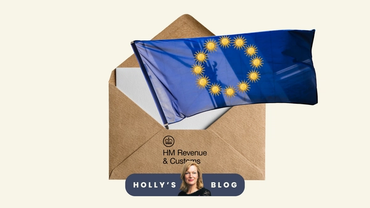Holly's Blog: Hurricanes and markets
18 Feb, 2022

Blimey, it’s like downtown Havana out there. Without the mojitos.
Here’s my extreme wind story. Snigger. I once got stranded in a 2-horse town in the middle of Cuba, heading West to go diving. A hurricane rolled in and I was evacuated back to Havana after a brief and unsuccessful fight with the authorities. (The police in Cuba weren’t very jolly). My fellow evacuee in the vehicle was a stuntman who had just finished a gig as James Bond’s body double. So that was fun.
It’s pretty gusty in financial markets too. (Nice link, no!?) Most diversified global funds are down about 10% - 12% over the last three months. The FTSE 100 is having an unusual moment of relative glory. And gold is pretty buoyant.
None of this is super complicated to work out. Vladimir Putin is worrying everyone. Enough said. Inflation is going short-term crazy. And there’s a hardcore energy crisis playing out. Everything costs more = higher cost of doing business = lower margins and/or higher costs for customers.
Why is the FTSE 100 happy?
The FTSE 100 is an odd index. It’s not that British, it’s global. The top 5 shares in it make up about 30%. And it’s a pretty dirty un-woke index full of unsexy sectors.
Shell is over 7% of the FTSE 100. Massive. Then it’s AstraZeneca. HSBC is over 5%. Unilever, maker of shampoo and soap clocks in next, followed by Diageo – parent of Johnny Walker whisky. So there you have it. Oil, drugs, money, soap and booze.
Oil is pushing $92 a barrel and heading higher = happy Shell. We all need drugs and shampoo (and arguably booze) even when things get tough = resilient AstraZeneca and Unilever. And the banks make more money when interest rates go up = happy HSBC.
Not so shiny in America
This is hugely different to the S&P 500 where about one quarter of the index is made up of future-facing frat pack tech boys – Apple, Amazon, Facebook (‘Medda’), Google, Microsoft and Tesla. Increasing rumbles about recession, combined with increasing interest rates, global wobbles and angry regulators present a difficult short-term outlook for these guys.
All that glitters
As for gold, this is actually a rather primeval indicator of fear. Quite literally it’s a store of value you can touch and hide under the metaphorical bed when nasty baddies like Putin start stamping on the world. The gold price shoots up when people around the world get scared. You can see the spike back in 2020, when the price went up by 35% between January and August, as we moved through the first alarm bells about Covid, to full-on global lockdowns.
What’s ahead? The Eeyore View
It’s an unsettling time. Someone I respect was telling me yesterday he’s pretty downbeat about what lies ahead. “My main worries lie in the second half of the year. My view remains of a deflationary economic bust with a corresponding huge fall in the markets. I hope I’m wrong but I think Central Banks have become trapped and they won’t be able to stop these events.”
I asked him what he’s done – not too much yet as he still thinks there’s some steam left in markets. But he thinks the 2 best-performing assets over this year will be US Treasury bonds and the dollar. He tips the M&G Macro Bond fund which usually “holds a fair amount in $ and US Bonds”. And notes that some investment trusts like Personal Assets, Ruffer and Capital Gearing will “probably lose less money.”
What’s ahead? The Balanced View
What do I think? Well. First, cash is safe but as a store of value it’s safely going backwards after inflation to the tune of about £5 a year in every £100 you hold. It’s not great for any long-term needs.
Second – and way way ahead in the distance, I think we know that some trends will be here long after Putin is but a nasty distant memory. Technology and the transition to a carbon neutral economy are two examples of mega trends which have a wall of money behind them and will be huge contributors to long-term shareholder wealth. None of this short-term noise is going to change that.
As ever, the difficult bit is what to do in the short to medium term. The answer to this will depend on whether you are likely to need to sell any investments in the next three years, for example. If the answer is yes, then share-heavy portfolios are never a great idea, and consider selling down and locking in some cash, especially if you think that things are going to get hairy.
If you don’t need the cash, and are a Long Termer, then most will say Do Nothing, because you cannot time markets. Which I have a lot of sympathy for.
I’d also say to beginner investors and those saving for the long-term that the next 12 months will present some lovely buying opportunities as the stock market is volatile and has some inevitable falls. Or – in other words – goes on sale.
Drip-feeding in, or arranging to contribute with a monthly direct debit is always quite sensible as it averages out the extreme buying points.
And finally I’ve written before about not having too much exposure to any one sector – at the end of last year I wrote about dialling down US tech stocks which can easily dominate our portfolios. I have more in the UK than has been fashionable. Other than that I’m not doing anything too different.
But I do have a bit of cash in some accounts for when, and if, the stock market goes on sale.
Have a lovely weekend everyone. And for anyone wondering, sadly the Stuntman was most certainly not the facial double for James Bond ;0)
Holly
Sponsored message: Fidelity
Learn more about investment trusts in only 90 seconds
What makes investment trusts unique? What are discounts and premiums? Why do trusts have an independent board? And what fees and charges should you expect? Learn the answers to these questions and more by watching our quick ‘Zoom-through investment trusts’ videos. Capital at risk.











